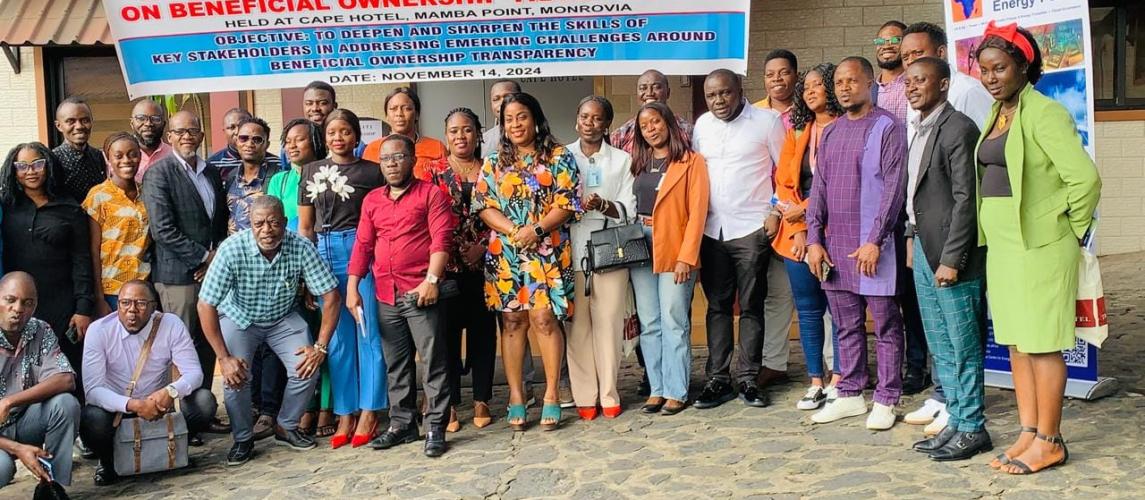
ACEP and LEITI Lead the Charge as Liberian Stakeholders Unite to Strengthen Beneficial Ownership Transparency
The push for greater transparency and accountability in Liberia's extractive industries took a significant step forward today, as the Africa Center for Energy Policy (ACEP) and the Liberia Extractive Industries Transparency Initiative (LEITI) hosted a One-Day Training Workshop on Beneficial Ownership (BO) Transparency in Monrovia. With the goal of sharpening the skills of key stakeholders and addressing emerging challenges around beneficial ownership transparency, the event attracted more than 40 participants representing 20 institutions across government, civil society, and private companies.
The workshop emphasized the importance of empowering stakeholders with the knowledge and tools to identify and track the real individuals—beneficial owners—who ultimately control or profit from companies operating within Liberia’s extractive sector. As extractive industries such as mining, oil, and gas remain central to Liberia’s economy, ensuring transparency in ownership structures is critical to combating corruption and enhancing good governance. The event, guided by the principles of the Extractive Industries Transparency Initiative (EITI), brought participants together to exchange ideas, share best practices, and discuss the necessary steps toward achieving a robust and transparent beneficial ownership regime in Liberia.
Jeffrey Yates, Head of Secretariat at LEITI, kicked off the workshop with a powerful message about the need for Liberians to take ownership of the process of beneficial ownership transparency. He emphasized that while international frameworks and initiatives like EITI provide a strong foundation, the true success of any transparency efforts must come from within Liberia itself.
“For this process to succeed beyond the crafted frameworks and international efforts, Liberians must take ownership of the process with utmost patriotism,” Yates said. He stressed the importance of continued engagement among all stakeholders to foster a national culture of transparency, one where beneficial ownership disclosure becomes not just a regulatory requirement but a deeply ingrained national priority. According to Yates, sustained dialogue and collaboration will be essential in overcoming the challenges that continue to impede progress.
One of the key themes of the workshop was the need for collaboration across sectors to enhance Liberia’s BO regime. Eliasu Ali, ACEP’s Policy Lead on Mineral and Mining, applauded the willingness of Liberian stakeholders to confront the issue of corruption head-on, even in the face of structural and financial difficulties.
“Liberian stakeholders have shown great commitment to fighting corruption through the implementation of a BO regime, despite the numerous challenges they face,” Ali remarked. He reiterated ACEP’s commitment to working alongside LEITI and other partners to ensure that Liberia’s beneficial ownership system is not just implemented but implemented effectively. Ali noted that identifying the true owners of companies operating in the extractive sector is crucial in preventing corruption, tax evasion, and illicit financial flows—issues that have long plagued resource-rich countries like Liberia.
Ali’s comments highlighted the broader goal of beneficial ownership transparency: leveling the playing field by ensuring that the real actors behind corporate entities are exposed. This transparency not only prevents individuals with hidden interests from exploiting Liberia’s natural resources but also ensures that the government and the public can hold companies accountable for their actions.
One of the major challenges raised during the workshop was the need for institutional reform, particularly regarding the Liberia Business Registry (LBR), the custodian of the country’s BO Register. Mohammed Dukuly, Deputy Director General for Finance at the Liberia Petroleum Regulatory Authority (LPRA), delivered remarks calling on the Liberian government to make a stronger commitment to ensuring transparency in beneficial ownership. He urged the government to grant the Liberia Business Registry (LBR) the autonomy it needs to function effectively.
“The Liberia Business Registry, as the custodian of the country’s BO Register, cannot fully function without autonomy,” Dukuly stated. He pointed out the inherent conflict of interest in the current structure, where the LBR operates as a subset of the Ministry of Commerce. According to Dukuly, this arrangement compromises the LBR’s ability to act independently, a critical factor if Liberia is to build a reliable and transparent BO regime. He called for the LBR to be made an autonomous agency, free from the influence of any government ministry, to ensure that its mandate is carried out impartially.
The workshop concluded with a renewed sense of urgency and determination among stakeholders. The discussions made it clear that while Liberia has made strides in the implementation of beneficial ownership transparency, there is still much work to be done. Achieving full transparency in the ownership of companies, particularly in the extractive industries, is no easy feat. However, with continued collaboration, stakeholder engagement, and the political will to enact necessary reforms, Liberia can move closer to a future where its natural resources benefit all its citizens, not just a select few.
As the country navigates its way through these challenges, the work of institutions like LEITI and ACEP, combined with the support of civil society and the private sector, will be critical in ensuring that the country’s resources are managed transparently and responsibly. Beneficial ownership transparency is not just a technical or legal issue—it is a vital step toward building a more accountable and just Liberia.
